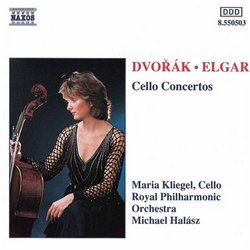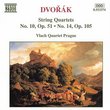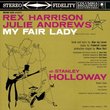| All Artists: Antonin Dvorak, Edward Elgar, Michael Halasz, Royal Philharmonic Orchestra Title: DvorŠk, Elgar: Cello Concertos Members Wishing: 0 Total Copies: 0 Label: Naxos Release Date: 2/15/1994 Genre: Classical Styles: Forms & Genres, Concertos, Instruments, Strings Number of Discs: 1 SwapaCD Credits: 1 UPC: 730099550321 |
Search - Antonin Dvorak, Edward Elgar, Michael Halasz :: DvorŠk, Elgar: Cello Concertos
 | Antonin Dvorak, Edward Elgar, Michael Halasz DvorŠk, Elgar: Cello Concertos Genre: Classical
|
Larger Image |
CD DetailsSimilar CDsSimilarly Requested CDs |
CD ReviewsSurprisingly good Mr JB | Karlskrona Sweden | 10/14/2000 (5 out of 5 stars) "Every time I find a new recording of the Dvorak and Elgar concertos recorded here, I take my time to listen to them. They are, especially the Dvorak, some of the worlds hardest (and most beautiful) cello-concertos, putting great demands on their interpreters. What makes those concertos even more interesting is the fact that their difficulty makes it even more possible to make different interpretations of them and their many nuances without knowing if it's 'wrong or right' - this means that some recordings fall out at once - and since there is no 'right way' of playing them, there's no way to make a 'middle of the road' performance - either you fail or you make it good. A few has succeded in making them really good. Ms Kliegel is one of those few who has made good recordings of these lovely pieces. At first, you might get worried about the Dvorak after hearing her first 20 bars - they're on the border to what you can tolerate in rythmical freedom - but thereafter Ms Kliegels performance is exceptional. Her intensity in the dramatic parts is second to nooone, nor is her touchingly soft melancholy in the more quite pieces - just listen to her playing of the slow part (at about 6.30) in the first movement. Her feeling for the slavic parts of the music seems genuine, sometimes you almost get at feeling of that you should dance to this music - her interpretation is charming and spontaneous, yet she never touches the border to banality. The Elgar concerto then - is it as good as the Dvorak? - Yes, it is mostly pure pleasure. Kliegel manages to make this piece as dark, sometimes noble, yet sensual, as it is, without sounding 'Imperial' and banal. There's always a great intensity in every tone she plays. Maybe you'll find that you have to listen to her interpretation a few times before clearly understanding it, cause it is not as easily received as say, du Pré's, otherwise excellent, version. But when you listen and find that Kliegel begins a little modest, you'll be the more happy when you find out that this is only to make the contrasts of emotions even greater - listen for example to the 'ladder' at 2.40, compared to exactly the same 'ladder' at 7.45 - the whole first movement is a great, but slowly developed emotional crescendo. The two following inner movements are superbly done, breathlessly beautiful and dreamlike. The last movement is a little reserved, but that's a minor objection indeed. Are there no weak parts then? Well, there are only two, quite small, objections, and those are concerning the conducting - it's not really in the same class as the soloplaying - and the sound balance - the cello is sometimes overpowered by the orchestra. The orchestral nuances, such as tremolos, especially in the strings, are sometimes also hard to notice. If comparing Ms Kliegels performances to other recordings, I would say that her Dvorak definately is among the very, very best - only Rostropovitch with Karajan clearly beats her in my taste, with its over all quality and definately better conducting and nuancing in the orchestra. As I began this review with - No good interpretation of this concerto sounds like the other. As taste changes from person to person, some of you might very well find Kliegels version 'better' than Rostropovitch's. The same might be said about the Elgar - but my alternative choice there is with du Pré (Emi). I now own four versions of these concertos that I like, none sounding very much like the other. But if you're looking for one record of these lovely pieces - this is definately the best choice if looking to the price. Then there are the more expensive Schiff, Yo-yo Ma and Harrell's versions - but to start with, this is a really great choice. Naxos has made it again."
|

 Track Listings (7) - Disc #1
Track Listings (7) - Disc #1








